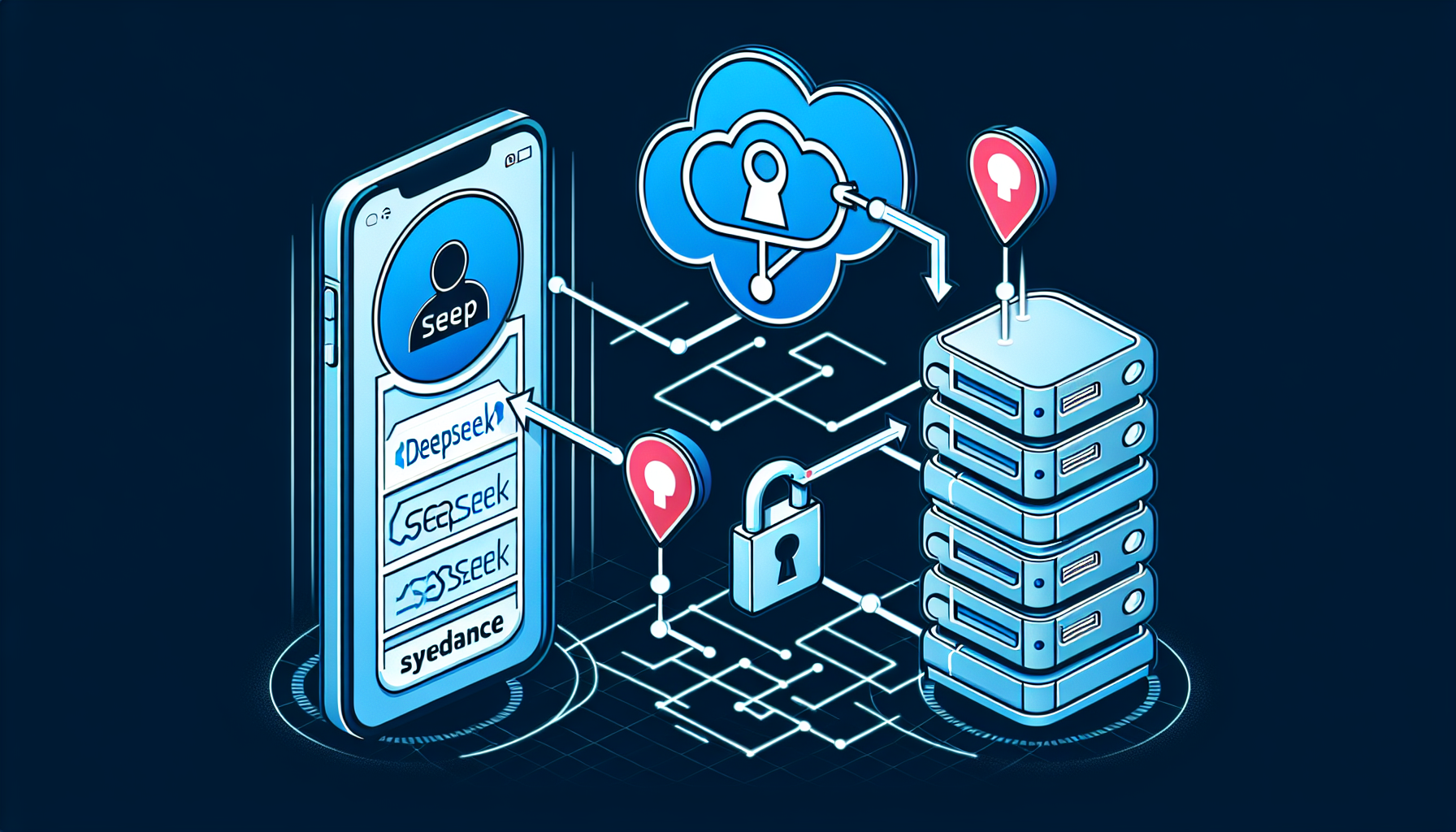
DeepSeek iOS App Raises Alarming Security Issues Due to Unencrypted Data Transmission
In a time when digital security is crucial, a recent finding regarding the DeepSeek iOS application has generated considerable apprehension within the cybersecurity community. The app’s practice of sending unencrypted data to servers operated by ByteDance has been flagged for possible security threats, including vulnerability to cyber attacks and unauthorized access to data.
Unencrypted Data Transmission: A Significant Security Concern
One of the most distressing elements of DeepSeek’s security flaws is its reliance on unencrypted HTTP endpoints. Security professionals indicate that this method is particularly concerning as it permits anyone within the network path to intercept data.
HD Moore, founder and CEO of runZero, voiced his worries, remarking that while it’s commonplace for mobile applications and their associated framework partners to gather device data, the reliance on unencrypted HTTP endpoints is simply unacceptable. This vulnerability exposes user data not only to the app’s developers but also to potential cybercriminals who can capture the data while it is in transit.
The Dangers of Disabling Apple’s App Transport Security (ATS)
Another significant issue highlighted in DeepSeek involves its choice to disable Apple’s App Transport Security (ATS). ATS is a security mechanism intended to mandate secure connections between applications and web services, ensuring that data is transmitted via HTTPS instead of HTTP.
Thomas Reed, a security expert at Huntress, underscored that disabling ATS is typically a poor practice. He elucidated that this choice enables the app to operate using unsecure protocols, rendering it susceptible to cyber threats. While Apple does allow developers to turn off ATS in specific circumstances, experts contend that there is no valid justification for an app to do so in the current digital environment.
ByteDance’s Role and National Security Implications
DeepSeek’s association with ByteDance, the Chinese technology powerhouse behind TikTok, has also triggered alarm bells among U.S. lawmakers. Given the ongoing examination of Chinese tech firms concerning data privacy worries, the transmission of unencrypted data to ByteDance-managed servers by DeepSeek has fueled fears of possible government surveillance.
On Thursday, U.S. lawmakers initiated efforts to call for an immediate prohibition of DeepSeek from all government devices. Their main concern is that the Chinese Communist Party (CCP) could leverage the app as a means to access sensitive American information. If the proposed ban is enacted, DeepSeek could face restrictions on government use within 60 days.
The Importance of Encryption in Mobile Applications
Encryption serves as a critical security protocol that safeguards user data from unauthorized access. When an application transmits data without encryption, it becomes at risk of cyber threats, such as man-in-the-middle (MITM) attacks, where hackers intercept and alter data as it travels.
For users, this implies that personal details—including login information, financial data, and private communications—could be exposed to harmful entities. In DeepSeek’s case, the absence of encryption not only endangers individual users but also raises wider concerns about national security.
Ways for Users to Safeguard Themselves
In light of the security threats associated with DeepSeek, users should undertake proactive measures to safeguard their data:
- Refrain from Using Apps with Security Issues – If an application is flagged for security vulnerabilities, it’s advisable to avoid its use entirely.
- Utilize a VPN – A Virtual Private Network (VPN) can encrypt your online activity, making it more challenging for hackers to intercept your information.
- Review App Permissions – Pay attention to the permissions requested by an app. If it seeks unnecessary access to sensitive data, consider the wisdom of using it.
- Stay Informed About Security Developments – Keeping abreast of cybersecurity news can help users make better choices regarding the applications they employ.
Conclusion
The revelation of DeepSeek’s unencrypted data transmission underscores the persistent issues in digital security. With escalating concerns surrounding national security and personal data confidentiality, it is vital for both users and policymakers to remain alert. As legislators advocate for a ban on the app, this situation serves as a reminder of the critical role encryption and secure data transmission play in mobile applications.
Frequently Asked Questions (FAQs)
1. What is DeepSeek, and why is it deemed controversial?
DeepSeek is an iOS app that has faced criticism for transmitting unencrypted data to servers managed by ByteDance. Security experts and U.S. lawmakers have expressed apprehensions regarding potential data exposure and national security threats.
2. Why is unencrypted data transmission a security hazard?
Unencrypted data transmission permits hackers and other malicious parties to intercept and manipulate data as it travels. This vulnerability can result in data breaches, identity theft, and unauthorized access to sensitive information.
3. What is Apple’s App Transport Security (ATS), and why is it significant?
ATS is a security feature in iOS that mandates secure HTTPS connections between applications and web services. Disabling ATS allows applications to operate using insecure HTTP connections, putting them at risk of cyber threats.
4. What part does ByteDance play in this matter?
ByteDance, the parent company of TikTok, is responsible for managing the servers to which DeepSeek sends data. Given concerns regarding surveillance by the Chinese government, lawmakers fear that the app may be exploited as a backdoor to access sensitive user information.
5. Could DeepSeek face a ban in the U.S.?
Yes, U.S. lawmakers are actively seeking a ban on DeepSeek from all government devices. If approved, the app could be restricted within 60 days due to national security issues.
6. How can users shield themselves from insecure applications?
Users can protect themselves by steering clear of apps with identified security flaws, utilizing a VPN for encrypted online activity, scrutinizing app permissions, and staying updated on cybersecurity threats.
7. Are there other apps that might be vulnerable to similar security problems?
Indeed, many applications may possess security vulnerabilities, especially if they disable encryption or employ insecure data transmission practices. Users should research app security prior to downloading and using them.